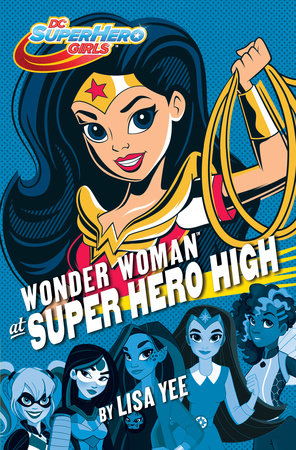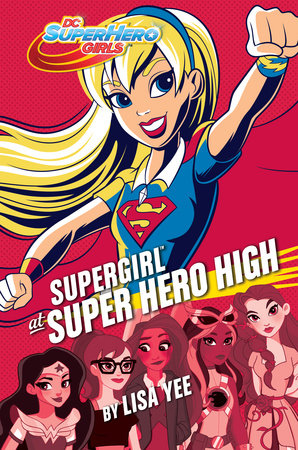Advice from a Super Hero Author and Mom: A Q&A with Lisa Yee
by Iva-Marie Palmer
If would-be writers were to distill author Lisa Yee’s career for advice on what makes a successful author down to a single nugget, it might be this: Write everything.
At least, that seems to be the motif of Yee’s career in words, doing everything from writing and producing for the Walt Disney Company to penning a speech for a past U.S. president to coming up with menu text for Red Lobster, the labels of refried beans, and the slogan “Pass the Old El Paso.”
Today, the multi-gifted writer is helming the soon-to-start series of DC Super Hero Girls middle grade novels, beginning with March’s release of Wonder Woman at Super Hero High. The book is one of Yee’s five (count ‘em, FIVE!) novels coming out in 2016. (In January, Yee released two books featuring Lea Clark, American Girl Doll of the Year, and researching those brought her face-to-face with sloths in the Brazilian rainforest, where she also ate a grub and hung out with snakes.)
When it comes to her real words of wisdom on what makes a writer, she says that the trick is simple and hard: it’s putting in the work. With such a full schedule right now, Yee writes every day. She also reads a lot, both adult novels as well as children’s books and young adult books that sometimes wind up as her selections for the NPR Book Concierge’s children’s/YA books of the year. And, okay, anyone who knows her on Facebook also knows there are baked goods. And chocolate. As she put it: “In particular, See’s California Brittle. Oh, yeah.” Read on for more of Lisa’s advice!
I read that your first book took you six years to complete, and this year you’re working on multiple projects. Can you talk about how that first book took shape (and your life while you were writing it) and how it’s gotten you to now?
I was working full-time and had two kids when I started writing. I had a vague idea of what the story was, but ended up writing Millicent Min, Girl Genius three different times, throwing away everything but the main character. Arthur Levine, my editor, was extremely patient, and it wasn’t until I went to my first SCBWI (Society of Book Writers and Illustrators) conference that I realized that when an editor asks, “Where are you with that book?” one shouldn’t say, “I’ll get to it, but I’m busy right now.”
Finally, I got serious about writing, thinking this might be my one shot at my dream and I’d better not mess it up.
What is the typical day like for you, if you have one?
This past year (2015) was extremely busy. I have seven books under contract, five coming out in 2016 and two more in 2017. That means that I have to write every day, whether I feel like it or not.
I’m currently writing four novels for the DC Super Hero Girls series, with the first, Wonder Woman at Super Hero High, coming out in March. In order to get up to speed on these, I immersed myself in the rich DC Comics lore. The deadlines for these books are quite tight and for a while I was working on them concurrently with the American Girl books. Therefore I had to approach writing very systematically, giving myself strict deadlines.
I usually get up around 9:30 AM and go to the gym. Then I tackle emails, business stuff, etc. I’m not one of those authors who can just start writing — I tend to procrastinate a lot. (Hello, Facebook!) So I used Anti-Social, a program to keep me away from social media sites. Though I often write in a coffee house during the day, the serious writing takes place between 10:00 PM and 3:00 AM.
Your subject matter is fairly disparate — from American Girl novels to contemporary YA to comic middle grade, and now a super hero series. Do you feel like you’re all over the place, or like this is just a reflection of your personality and you as a writer? How do you juggle the different projects and the different things they require from you?
I’m interested in many things, and I think my writing (and reading) reflects that. However, character development is key to me and I begin there for every story. Having worked as a journalist, a creative director, a Writer/Producer for Disney, an advertising copywriter, etc., I understand deadlines and jumping from one project to another. I’m just happy that now I can focus on books, even though they may be all over the place!
When did you know you wanted to be a writer?
When I was 10 years old I knew I wanted to be a writer. An author, specifically. But I was too embarrassed to tell anyone. So I didn’t do anything about it until after I became a mom. I’d tell my kids that if you have a dream, you need to go after it. And I realized, I wasn’t doing that. So that’s when I started writing for myself — books.
What was the biggest encouragement you got, and how did you use it to your advantage?
Being pulled out of the slush pile by Arthur Levine was amazing. He always had faith in me and what I could do. In fact, the first time we met in person, he said, “I know you can do this, but I don’t think you know you can. So, tell you what, you give me an outline, and I’ll give you a book contract.”
Suffice to say, I gave him that outline!
What was the biggest source of discouragement you received and how did you combat it?
The biggest source of discouragement came from myself. I had so many excuses for why I couldn’t be an author. I was too busy. My job took up too much time. I needed to spend more time with my kids. I wasn’t good enough. I was a fluke. And then I just shut it all down, and got serious, realizing that if I truly felt that way, I had no business writing. And the thought of that slayed me. So I stopped the pity party and started writing (albeit after everyone was asleep).
What’s been the most fun thing about working on the DC series?
Writing the DC Super Hero Girls series is a total joy and thrill. I have never had so much fun writing. I mean, seriously? I get to write about Wonder Woman, Supergirl, Batgirl, Katana, and all these iconic, amazing, and strong female characters. Because we are setting them in an alternate universe, everyone is in high school together; they aren’t the adult super heroes as we currently know them. No, these are teens — with all the uncertainty, angst, and drama that comes with that.
I love delving into the characterization of each and writing about what motivates them, what they are scared of, what makes them happy, what they fear. [I love] making them more approachable, dare I say, more human? Plus, plus … I get to think of ways to destroy the world, then save it! How cool is that?
What, if anything, still surprises you about making your living as a writer?
When my first novel came out in 2003, I was convinced it was also my last. I never dreamed I could do this for a living. By the end of next year, I will have 18 books published. You know, if I were to wake up tomorrow and someone were to tell me it’s all been a dream, I’d still be happy, because it’s been a thrilling, wild, and wonderful ride.
Do you have words of advice for someone who really thinks they want to do this?
It’s work. Writing really is. There’s so much non-creative stuff involved with being creative. Like learning the discipline to sit down and do it, even if you don’t feel like it. But it’s also pure joy when you write that great sentence, or when you finish a book, or when a reader writes to you. So, if you’re serious about writing, toss aside the excuses, and get to work.
-
By the Author:


